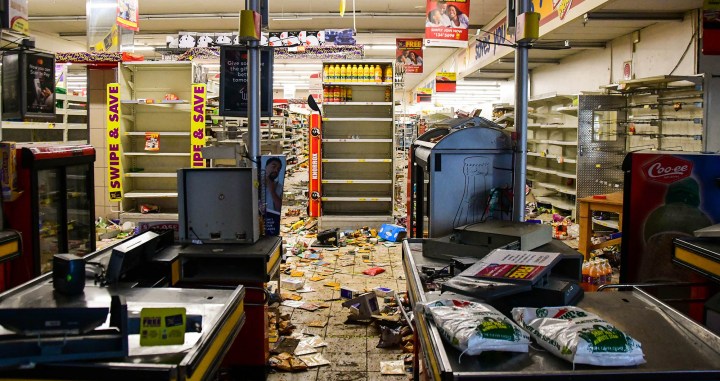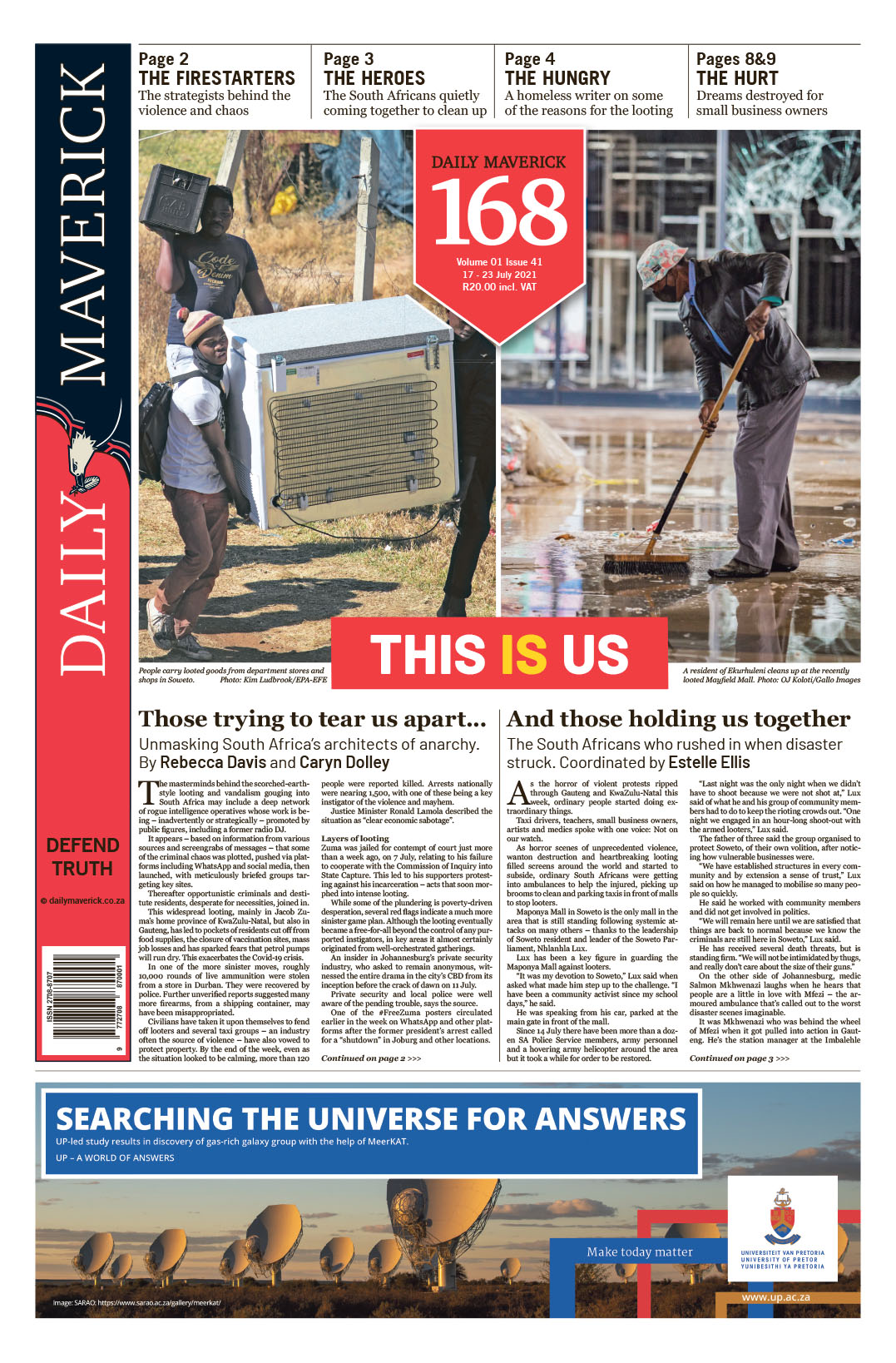BUSINESS MAVERICK 168
Looting could cut GDP growth by 0.7%

Shops in malls and elsewhere have been stripped and gutted. Fuel refineries have closed. Economists are trying to tot up the damage, likely to be huge.
First published in the Daily Maverick 168 weekly newspaper.
The looting and rioting that have laid waste to swathes of KwaZulu-Natal and Gauteng in the wake of former president Jacob Zuma’s jailing will curtail economic growth this year but are not likely to spark a rate cut next week when the central bank’s Monetary Policy Committee (MPC) meets.
Economists have been scrambling to re-evaluate their estimates of SA’s growth this year, which was a complicated issue even prior to the week’s looting spree. So far, the dominant voice is saying that, although the economy will be hit, the longer-term effect will be minor. The rand has regained its pre-looting exchange rate, and retailers trading on the JSE are down only marginally.
But some economists wonder whether this isn’t just because the impact of the looting’s effect on the economy hasn’t become fully visible yet.
“We think investors still don’t really get the scale of what has happened,” said the head of capital markets research at Intellidex, Peter Attard Montalto.
His estimates suggest national retailers have lost about R5-billion in stock across the country as a whole. More than 800 non-shopping centre stores were looted and 100 burnt out. More than 200 entire shopping centres were looted and destroyed.
The effect on the Durban area will be particularly severe. He estimates damage to property at R15-billion, and that 50,000 informal traders and 40,000 businesses in the area have been affected. Durban’s GDP will lose to the tune of around R20-billion, and there is a risk that 150,000 jobs will be lost.
Overall, Attard Montalto cuts his GDP forecast by 0.7%.
Johann Els, the chief economist at Old Mutual, which has been more bullish than most on South Africa’s growth prospects, said he will probably trim his forecast for 2021 growth by 0.5%, and that the government should double its speed on structural reforms to make up for the lost ground.
“Since current events present definite downside risks to growth, our current GDP forecasts may need to be adjusted from 5.5% back down to 5%,” Els said. “Once the violence, currently limited to two provinces, abates, rebuilding and restocking of ravaged infrastructure and supplies should support a short-term increase in economic activity.”
Rand Merchant Bank put the potential losses at R200-billion, but that number is likely to grow, with a number of companies beginning to report harrowing tallies of the damage wrought, especially food producers and among property firms with holdings in the shopping centres and retail sites that became the main target of looting.
Retail takes a whack
The Consumer Goods Council of South Africa is warning of food shortages, saying up to 800 retail stores had lost an estimated R5-billion to date.
Its counterpart, the Franchise Association of South Africa, puts the number of supermarkets looted at 500 nationally.
Consumer spending had already taken a knock because of intermittent lockdowns and bans on alcohol and sit-down restaurants that began last year. There were signs of recovery in the first quarter, expanding 4.7%, but that bounce will now be short-lived, with categories that had performed well then – clothing, footwear, small furniture and household appliances – the hardest hit by the violence.
Food staples maker Tiger Brands says it suffered stock losses of R150-million, and it has subsequently suspended bread-making and distribution operations in KZN. Famous Brands, which operates 3,000 restaurants nationwide, said close to 100 stores (mostly in KZN) were non-operational. Durban-based Mr Price has closed just shy of 550 stores. Grocery chains Shoprite, Pick n Pay, Spar and Woolworths have also shuttered some stores. The list is long.
Retail trade and production accounts for about 20% of gross domestic product – about R1-trillion. In times of economic recovery, retail and production are often a lynchpin for growth. That is unlikely to be the case this time around.
The fuel situation
The temporary closure of the SA Petroleum Refineries (Sapref), whose refinery operations in Durban supply about a third of SA’s daily fuel consumption, has sparked fears that the country’s pumps will soon run dry. Long queues have been reported at petrol stations in Durban, and others were closed.
The government and industry associations said a preliminary assessment indicated that SA had sufficient fuel stock. The Fuel Retailers Association of Southern Africa said some petrol stations were dry because certain areas, especially in KZN, had been a hotspot for social unrest and the delivery of fuel had been affected.
Sapref has declared force majeure to its customers, including filling stations. The company is indicating it cannot honour contractual obligations to supply fuel to its customers.
The social unrest has led to the closure of major arterial routes in KZN, resulting in Sapref’s suppliers suspending deliveries of “critical materials” to its refinery because of safety concerns for their staff and damage to their vehicles. This further hampered Sapref’s ability to refine and deliver product, prompting the company to shut its operations and declare force majeure, Sapref spokesperson Hlengiwe Hlela told DM168. She didn’t answer questions about whether Sapref could still supply fuel to other provinces unaffected by the street violence and looting.
Sapref, jointly owned by Shell and BP, has a daily capacity of 180,000 barrels, about 35% of the country’s daily fuel consumption. Asked about its fuel reserves, Shell said it had “enough [fuel] product to meet demand; however, this is subject to our ability to deliver product safely”. BP didn’t respond to a request for comment.
Before the social unrest, SA’s 700,000-barrel-a-day (b/d) refining industry had reduced capacity. Engen’s refinery in Durban and Astron Energy’s refinery in Cape Town remain shut after recent safety incidents. The refineries have a combined daily capacity of about 230,000 barrels.
With the refineries of Sapref, Engen and Astron out of action, this leaves the Natref refinery in the Free State as a major source of fuel for SA. Natref is a joint venture operated by Sasol and Total.
Sasol said the 110,000 b/d Natref refinery was stable and running as normal. So is its Secunda synfuels facility (160,000 b/d). “We have experienced some disruption in some of our supply routes where the protest action is ongoing. We are carefully monitoring developments in these areas,” said the synthetic fuels and chemicals producer.
The damage to shopping malls
The retail industry has managed to feed people in the 15 months of Covid-19 in SA. But the industry is struggling to do this job after shopping malls and stores were damaged in recent days.
Estienne de Klerk, the South Africa CEO of Growthpoint Properties, a JSE-listed property company, said it may take two years to fix a shopping mall that has been burnt down.
In the interim, consumers – especially those in township areas, where the damage has been mostly reported – will be forced to spend an inordinate amount of travel time and money to find operational shopping malls for basic household goods such as bread and milk. But shopping mall owners are still committed to the township economy.
Ports on pause
On 14 July, Transnet declared force majeure on its 688km Natcor rail line, which connects Gauteng and KwaZulu-Natal, a key artery for imports and exports. Transnet also shut its Richards Bay and Durban ports. Combined, they handled more than 200 million tonnes of cargo annually. Delays and derailments were already costing the ports billions per year, a situation likely to worsen as containers are either stranded at the mines or farms inland, or are sitting idle at the ports. DM168
This story first appeared in our weekly Daily Maverick 168 newspaper which is available for free to Pick n Pay Smart Shoppers at these Pick n Pay stores until 24 July 2021. From 31 July 2021, DM168 will be available for R25 at Pick n Pay, Exclusive Books and airport bookstores.





















 Become an Insider
Become an Insider
On the other hand GDP could increase on the back of restocking and reconstruction financed by SASRIA payouts.
Add in
1. Lost investments by people and businesses, Local & FDI.
2. Perpetuate into future years, the price will be
~=> 1%+ gdp (=~R50Bn) loss for 20 years with 3% inflation = > ~ R750bn
Do the maths! Just this 1 weeks ‘social unrest’ is like burning 2 months earnings for the whole country. Anarchy and the continued economic repression of corruption are not the answer.
Yes a catalyst event but 10 years of failure to deliver economic growth is the real root cause
The current status quo before last week is unjust – the root cause failure to deliver economic growth and narrow the economic divide.
We need another answer to the ANC policy failures and delivery failures and internal rift which mean that SA inc is now actually burning.
Now maybe the time for another government of national unity.